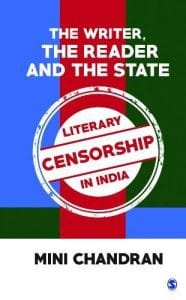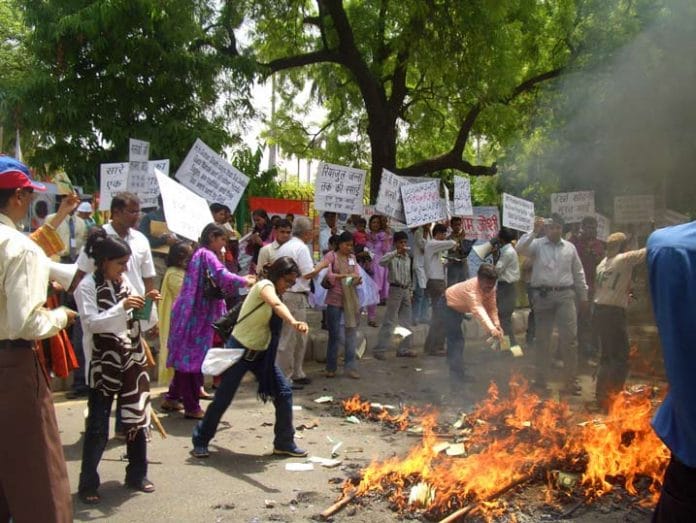The mob as censor is a convenient clamp-down weapon for democratic governments.
The killing of Gauri Lankesh has raised a stir over India’s tolerance levels to dissent, and the atmosphere of totalitarian control that our democracy is gradually sliding into. The general line of argument is that this should not have happened in a democracy where freedom of expression is a fundamental right guaranteed by the Constitution, implying that thought control and restrictions on free speech are the hallmark of dictatorships.
This equation of absolute silencing of dissent with despotic regimes has come to us historically through ‘famous’ despots like Hitler or Stalin and literally through works like Orwell’s 1984. ‘Big Brother is watching you’ became the ultimate nightmare of total visibility which denies individual rights of free thought, speech, and assembly.
But how well-founded is the faith in our democratic rights to free speech? Even a cursory look at our Constitution shows us that this is not an absolute right. After all, for the freedom of speech guaranteed by Article 19 (1), we have a caveat which states that the freedom can be reined in if it threatens public order and decency or offends religious sensibilities. If so, how free is a ‘relative freedom’?
The usual reason that is handed out in defence of restrictions on free speech is that in a multi-cultural, multi-religious country like India we have to exercise extreme caution in expressing our opinions freely and fearlessly. For what you consider to be a perfectly valid and justified viewpoint might not appear so to your neighbour, and we are, as Salman Rushdie has pointed out, living in a “culture of offendedness”.
The tragic history of communal riots also shows us that a very individualistic, private feeling of offence can often translate to a dangerously public expression in India. Therefore, the writer is advised not to transgress these unwritten laws of political correctness lest s/he touch a raw nerve when it comes to caste, religious or gender identities.
It is indeed a sign of social civility to be careful not to offend the sensitivities of anybody, especially communities that are generally considered peripheral or marginalised; writers and speakers on public forums in democratic societies ought to be politically correct, recognizing that outrage is a “response of the powerless”, as Coetzee termed it.
People who take offence expect a sanitized literature that does not question status quo or provoke debates.
Nothing could be farther from reality. Literature is, and has to be, politically incorrect because it has to ask uncomfortable questions of society and culture which otherwise would be brushed under the carpet. If Valmiki had not questioned the cruelty of what was then an acceptable hunting practice, there would not have been a Ramayana.
Even the most innocuous writing might provoke somebody somewhere, which can grow into a mindless collective called the mob. The mob as censor is a convenient clamp-down weapon for democratic governments; after all, an elected government is acting ‘for’ the people when it attempts to silence a writer who they find to be a public disturbance. This is also the most dangerous of all forms of silencing because writers will be reluctant to break the code of political correctness surrounding sensitive issues.
The individual who clamours for the preservation of public order, decency, morality or religious sentiments in the name of democratic freedoms is the biggest enemy of free speech in our country. It is interesting that the government has not taken the initiative to ban a book in recent years in India. It has only bowed to ‘public pressure’ in instances of book bans. This was the case with Rushdie and Nasreen while the publishing houses decided to withdraw the books of Doniger and Lelyveld. Perumal Murugan decided to stop writing altogether when public pressure forced him to flee his home and seek refuge elsewhere.
Writers like Rushdie and Murugan at least had the support of intellectuals in their fight against the silence imposed on them, but a Santhali writer like Hansda Sowvendra Shekhar did not have even that consolation. The recent ban on his collection of short stories The Adivasi will not Dance was in response to his own community members’ protest that one story titled “November is the Month of Migrations” was demeaning to the women of the tribe. Intellectuals were caught in a bind – if they openly supported Shekhar, it would have meant supporting the perceived insult to a marginalised tribe, and opposition to him would imply the acceptance of restrictions on free speech. Neither stand would have been politically correct. As a result, the ban on Shekhar’s book went largely unnoticed.
I think this is the real challenge before us today – how to work around the problem of the very democratic value of political correctness morphing into a very undemocratic censor of free expression in art and literature.
 Dr. Mini Chandran is professor at Department of Humanities and Social Sciences in IIT Kanpur and author of ‘The Writer, the Reader and the State: Literary Censorship in India’ published by Sage Publications.
Dr. Mini Chandran is professor at Department of Humanities and Social Sciences in IIT Kanpur and author of ‘The Writer, the Reader and the State: Literary Censorship in India’ published by Sage Publications.






